November 21, 2014
Perception, Awareness, Efforts over Biodiversity Shrinking
Keywords: Ecosystems / Biodiversity Government Policy / Systems

Image by yamauchi Some Rights Reserved.
A survey of Japanese people on biodiversity revealed a decrease in people's perception and awareness of and efforts addressing biodiversity, causing anxiety among relevant parties. The following are the survey results concerning biodiversity from a public opinion poll on environmental issues, which was released in September 2014 by the Cabinet office.
The survey was carried out between July 24 and August 3, 2014, and targeted 3000 people aged 20 years or older nationwide. The aim of the survey was to research public awareness about environmental issues and make use of the findings for later initiatives. Individual interviews produced 1,834 valid responses, yielding a 61.1 percent (%) collection rate.
The survey results on biodiversity are as follows: concerning the recognition of the word "biodiversity," 16.7% of respondents replied that they knew what biodiversity was. This represents a 2.7 point decrease from the last percentage of 19.4 in June 2012. Respondents totaling 29.7% replied that they didn't know what it was but had heard of the word, which is a 6.6 percentage point decrease from the previous survey. Meanwhile, 52.4% replied that they had never heard of the word, up 11.0 points from 2012.
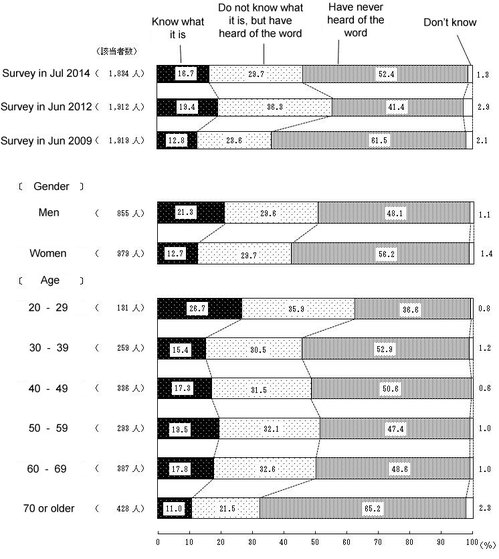
Source: Public Opinion Survey on the Environmental Issues,
the Cabinet Office of Japan, 2014
Regarding recognition of the National Biodiversity Strategy, 4.0% replied that they knew what it was, down 2.1 points from 2012, while 20.8% replied that they didn't know what it was but had heard of the word. This was a 7.5 point decrease from the last percentage of 28.3. Lastly, 73.8% replied that they had never heard of the word, indicating an increase of 11.6 points compared to the 2012 survey.
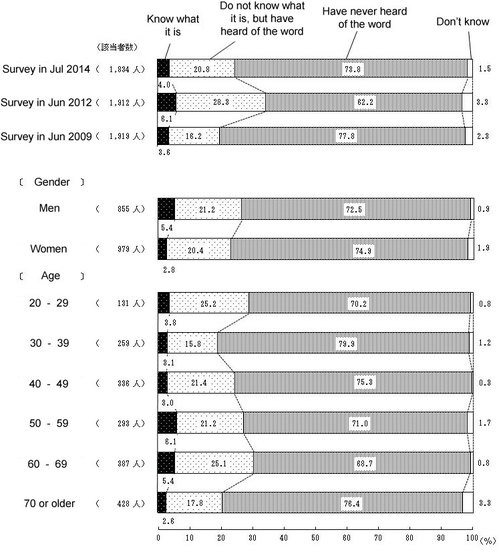
Source: Public Opinion Survey on the Environmental Issues,
the Cabinet Office of Japan, 2014
Only 2.4% of respondents said they knew the contents of the Aichi Biodiversity Targets, down 1.5% from the previous survey, while 9.1% said they had heard of the targets but did not know the contents in detail, representing a drop of 5.3 points since last time. Those who had never heard of the Aichi Targets accounted for 87.4%, up 9.7% since 2012.
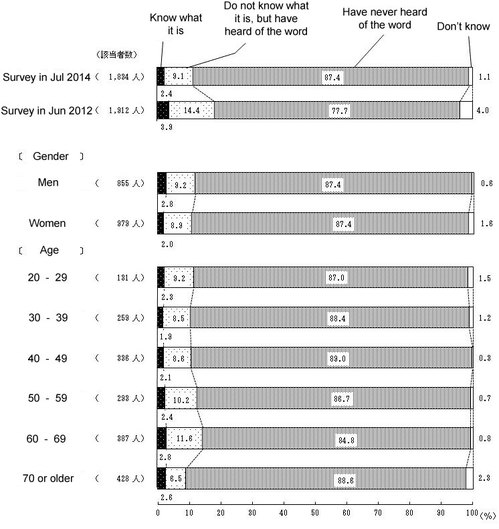
Source: Public Opinion Survey on the Environmental Issues,
the Cabinet Office of Japan, 2014
When asked about their perception of biodiversity preservation measures, 33.8% said "we should tolerate some limitation on human lifestyles in order to preserve the environment to support biodiversity," which is 4.9 points lower than the previous survey. On the other hand, 54.3% responded that we should promote the preservation of environments supporting biodiversity only when doing so does not place limitations on human lifestyles, which is slightly higher than the 52.8% in the 2012 survey. Likewise, people who said that a loss of environments supporting biodiversity was unavoidable in order to ensure the prosperity and convenience of human lifestyles accounted for 4.7%, up 2.6% compared to the last survey.
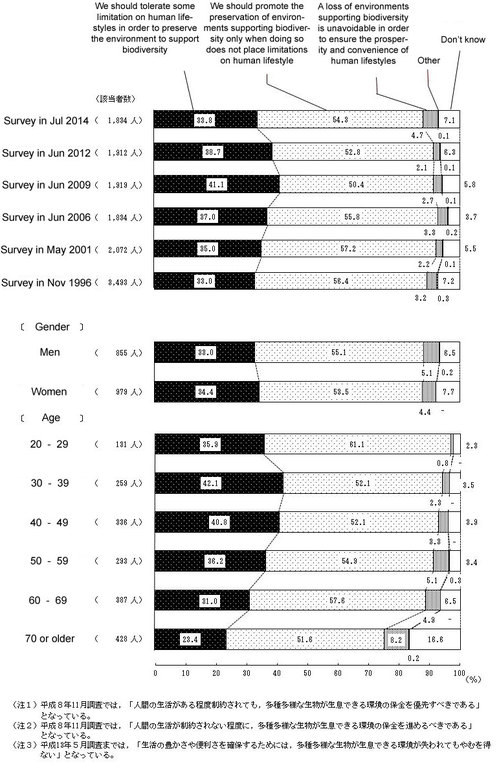
Source: Public Opinion Survey on the Environmental Issues,
the Cabinet Office of Japan, 2014
When asked about specific measures they would undertake to conserve biodiversity, 60.7% mentioned global warming counter measures such as energy conservation and setting heaters and air conditioners to appropriate temperatures (down by 11.2 points), 50.8% said purchasing seasonal and local products (down by 6.9%), 45.7% said being responsible owners of pets or other living things (down by 8.6 points), 36.9% said choosing environmentally friendly products over other products (down by 10.5%), and 35.3% said observing living things that are nearby, and going out to enjoy nature (down by 2.1 points).
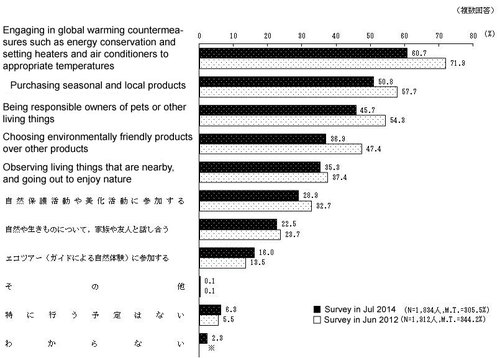
Source: Public Opinion Survey on the Environmental Issues,
the Cabinet Office of Japan, 2014
Biodiversity has had less media coverage due to fewer international conferences and events held since the last survey, which may explain the survey results. Even so, the overall drop in recognition and awareness of and activities addressing biodiversity is alarming.
Written by Junko Edahiro
Related
"JFS Newsletter"
- 'What Are the Roles of Zoos Today?' - Interview with Director of the Popular Asahiyama Zoo
- Nishiawakura's Initiative for 100% Energy Self-Sufficiency, and a Municipal ICO Scheme
- 15-Year Integrated Forest Environment Education in Shimokawa, Hokkaido to Support Sustainable Forest Management
- Fifth Contest to Award Excellent Environmental and Social Practices by Junior High, High School Students
- Increase Revenues without Increasing Catches -- How the Sustainable Sakura Shrimp Fishery in Suruga Bay Does It


